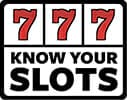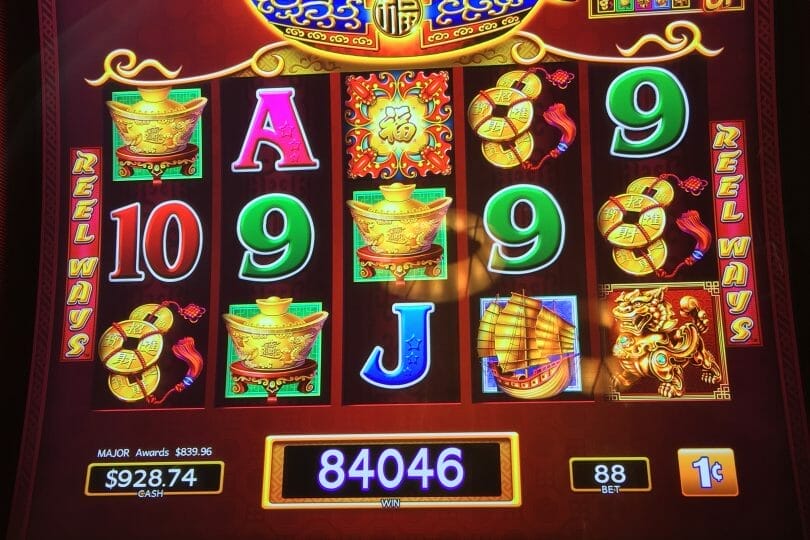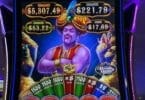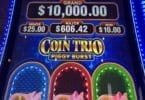I recently received this email in, asking for more clarity around the Dancing Drums Grand progressive jackpot and how it’s awarded, although in many ways this could answer for games with similar jackpot structures:
I have a question about the Dancing Drums, that I didn’t see answered on your page. Effectively, how does it work as far as the higher progressives being paid out like the Grand? Let’s take for example Dancing Drums Explosion, where the progressive is usually around $300000 or more. What decides when that hits?
Is there some secret server that is calculating how much money was earned until it eventually gets released? I know every spin is random, but machines aren’t designed to lose, so if the odds are 1 in however many million, how come there are very very very few winners on YouTube that won the grand on regular dancing drums which is about $10K when there’s thousands upon thousands playing every day, it wouldn’t take more than 1 day for those machines to make $10K….
So first off, let’s clarify a few things that I think will help reset the thinking.
- The average slot makes the casino a couple hundred dollars a day. Some will make more if they’re busier or more popular titles, but machines sit idle during quieter times, between players, etc. Some players spin 88 cents a spin, some $8.80, and on Dancing Drums some can even opt to do 8 cents a spin!
- The average slot player will wager 400-600 times an hour. (It could be more on a game without any bonuses, but in this case bonuses and progressive picks will eat into the number of spins that can actually take place in real time.)
- Only a small percentage of the overall wagers are connected to the progressives. Two percent is a pretty common number, but will vary by game design and type.
You mention both Dancing Drums and Dancing Drums Explosion. Let’s start with Dancing Drums.
So we have this Grand progressive jackpot that starts at $10,000. For simple math, let’s say 1 percent of the wagers made my players are contributed to the Grand. (In reality it is likely a smaller number, but let’s use that for simplicity.) If $10,000 is built up by 1 percent of the wagers, that’s $1 million in wagers just for the bets to cover that $10,000 starting amount, and of course it will increment too.
$1 million in wagers at the max bet of $8.80 a spin (presuming the least number of spins needed) is 113,636 spins. (If it was built up by minimum bet with all five gold symbols active, effectively add a 0 to these numbers for an 88 cent bet vs. $8.80 bet).
If we presume 500 spins per hour on a single machine, using the midpoint of the range I gave above, we’re talking 227 hours of non-stop max bet spinning to cover that minimum bet, which is approaching 10 days of uninterrupted max betting. (Min betting we’re talking 2273 hours, or about 95 days.)
Now, the machines are generally banked, so you might have 2, 4, 8 machines feeding the progressive, so you have that speeding it up, but then machines sit idle between players, overnight or during quieter casino periods, which in turn slow it down, as would lower bets vs. higher bets. And again, that 1 percent is probably a rosy contribution number – it could be a quarter of a percent, which would make it take four times as long as the math described above.
All of this is to say that the machines aren’t pulling thousands of dollars a day, just to pay out that Grand jackpot progressive. Most of the pays are elsewhere, such as the base game or free spins, or even the Mini and Minor, which increment much faster and are of course paid off much more often. So that tends to lead to the Grand being an exceedingly rare occurrence, and how that 1 in millions shot is really something that happens that rarely.
As far as when it actually goes off, it isn’t about measuring when the game has collected enough – the math is designed to pay it out at the right frequency over time that the game will collect enough money on the way. It’s similar to something like Powerball in that aspect – there’s enough combinations, and the odds structured in a way, that the game will cover its costs and then some over time, even if they manage to give away a couple of jackpots in quick succession.
Machines aren’t designed to lose, but they could go negative in the very short term if a progressive is paid out. But casinos look at the long term, and it tends to work out over time.
Dancing Drums Explosion is a bit different in that it layers on a wide area progressive. So now you’re also playing against other players in other casinos, with a progressive that’s even harder to hit (on that game you have to upgrade the progressives and then still get the Grand – not a simple feat).
More machines feed the meter, and it’s won less often. Also, that progressive may be shared by other games that aren’t Dancing Drums Explosion, so the progressive might not be won on that machine type at all! So wins become even more rare on that particular game.
But even in these scenarios, it’s all still driven by the random number generator in each slot machine – it’s just an exceedingly rare outcome. No external meter exists – they’re able to design it within the game’s design and each slot’s RNG to ensure it only pays out about as often as it should.
So hopefully that helps clarify how these progressives grow and are won. But the conception that slots are making thousands a day each is probably what throws the thinking off – they actually don’t make that much as a rule, although over time they certainly make plenty.








